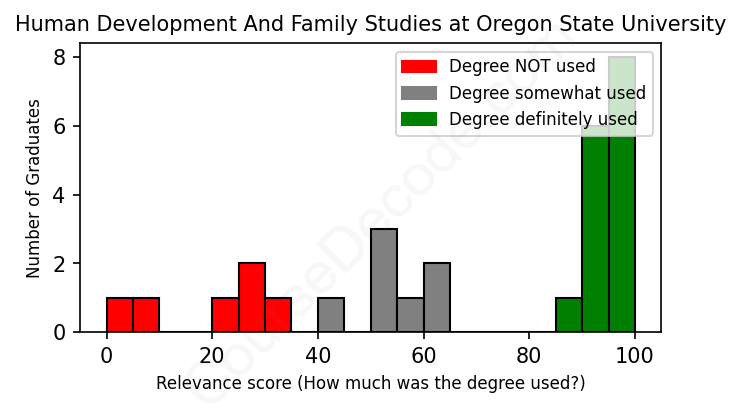
First, some facts. Of the Human Development And Family Studies graduates from Oregon State University we've analyzed , here's how many have used (or NOT used) their degree in their career:

These are estimates based on AI analysis of 28 LinkedIn profiles (see below).
The verdict? Slightly above average. Overall, with an average relevance score of 68%, Human Development And Family Studies graduates from Oregon State University have a slightly higher likelihood (+1%) of finding work in this field compared to the average graduate across all fields:
And for comparison, here's the chart for all profiles we've looked at across all degrees.
Also, after graduating, 46% of these graduates have pursued further education other than another Bachelor's degree (such as a Masters degree or other), compared to the average across all profiles of 35%. This suggests you may need more than just a Bachelors degree to be competitive as a Human Development And Family Studies graduate.
See the details:
|
Relevance score: 95% We think this person has gone into a career highly relevant to their degree. We think this person has gone into a career highly relevant to their degree.
DEGREE INFOGraduated in 2018 from Oregon State University with a Bachelor's degree in Human Development And Family Studies. Also pursued further education since (see below). JOB HISTORY SINCE GRADUATIONStudent Teacher West Linn Wilsonville School District Aug 2018 - Jun 2019 Service Expert Lead  24 Hour Fitness Jun 2019 - Dec 2019 Long Term Substitute Teacher  Gresham-Barlow School District 10J Oct 2019 - Aug 2020 Elementary School Teacher  Gresham-Barlow School District 10J Aug 2020 - Present FURTHER DEGREES DONE SINCE GRADUATINGMaster's degreePortland State University 2018 - 2019 ABOUTI attended Oregon State University for my Bachelors Degree in Human Development and Family Studies (2014-2018). After receiving my Bachelors Degree, I attended Portland State University for my Masters Degree in Education. (2018-2019). |
The top 10 most common jobs done by the graduates we've analyzed (ranked most common to least) are:
After analyzing the job roles of graduates from Oregon State University with a degree in Human Development and Family Studies, it’s clear that many of them have pursued careers that are closely aligned with their studies, particularly in educational and social services. A significant number of graduates became elementary and preschool teachers, where their understanding of child development directly contributes to their effectiveness in the classroom. Additionally, many have taken on roles in social services, such as Social Services Specialists or Family Advocates, where they can apply their knowledge of family dynamics and human behavior to support families in various ways. These positions, especially in teaching and social services, demonstrate a strong link to their academic background and highlight the relevance of their degree.
However, not all job paths taken by these graduates are directly related to Human Development and Family Studies. Some individuals found themselves in roles like administrative assistance, sales, or even coaching positions that, while they may utilize some interpersonal skills, don't fully employ the core principles of the degree. Positions in areas like customer service or financial coordination seem to lack the depth of understanding required for human development, showing a mixed bag of relevance in the job market for these graduates. Overall, while many are thriving in fields that resonate with their training, there’s a noticeable portion exploring careers outside the direct application of their Human Development and Family Studies background.
Here is a visual representation of the most common words in job titles for Human Development And Family Studies graduates (this is across all Human Development And Family Studies graduates we've analyzed, not just those who went to Oregon State University):

Graduates of the Human Development and Family Studies program at Oregon State University seem to embark on a variety of career paths, with many finding roles closely related to their degree. Right after graduation, it looks like a good number of them start out in positions such as elementary and preschool teachers or work in social services. For example, many went directly into teaching, taking up roles as kindergarten or first-grade teachers, while others began as social services specialists, diving into the world of human care and support. This initial trend indicates that the degree aligns well with careers focused on child development and family advocacy, which is pretty exciting for those interested in making a difference in people’s lives.
Looking further down the line, about five to ten years after graduation, many alumni continue to advance in these fields. Teachers often find themselves in specialized roles, like English Language Development Specialists or district-level educators, showcasing their growth in the education sector. Others shift within social services, moving into analytical or supervisory roles, such as Operation and Policy Analysts or ERSEA Supervisors. However, not everyone sticks strictly to human development; some diversify or pivot into different fields, such as healthcare and business roles. Overall, while there are some who branch out into unrelated areas, many graduates appear to be leading fulfilling careers that reflect their educational background, focusing on improving the lives of individuals and families in various capacities.
Honestly, a Bachelor’s degree in Human Development and Family Studies at Oregon State University is generally considered to be on the easier side compared to some other majors. It’s definitely not a walk in the park—there’s still some solid coursework and you’ll need to engage with theories and research about human behavior and relationships. But, if you’re someone who enjoys making connections with people and learning about families and development, you might find it pretty enjoyable and manageable. It does require commitment and some critical thinking, but overall, it tends to be more accessible than, say, engineering or chemistry degrees, which can be super intense. So, if you’re passionate about the subject, you’ll likely find it to be a fulfilling experience!
Most commonly, in the LinkedIn profiles we've looked at, it takes people 4 years to finish a Bachelor degree in Human Development And Family Studies.
Looking at the job history of these Oregon State University Human Development and Family Studies graduates, it seems like a mixed bag when it comes to their earnings. Many of them have landed stable positions in education, social services, and health care, which can be rewarding both emotionally and financially, but teaching roles, in particular, often don't pay a ton. For instance, elementary school teachers usually start out around $40k to $50k, which is decent, but not exactly rich. On the other hand, some graduates, especially those in managerial and specialized roles like doula services and loan origination, likely have made above-average incomes. Overall, it looks like some are doing okay financially, especially in stable fields, but not everyone is raking it in—typical for many graduates in these fields!
Here is a visual representation of the most common words seen in the "about" section of LinkedIn profiles who have a Bachelor degree in Human Development And Family Studies (this is across all Human Development And Family Studies graduates we've analyzed, not just those who went to Oregon State University). This may or may not be useful:

Here are all colleges offering a Bachelor degree in Human Development And Family Studies (ordered by the average relevance score of their Human Development And Family Studies graduates, best to worst) where we have analyzed at least 10 of their graduates:
| College | Score | Count |
|---|---|---|
 Oklahoma State University Oklahoma State University
|
91 | 10 |
 University of Wisconsin-Madison University of Wisconsin-Madison
|
84 | 15 |
 University of Wisconsin-Stout University of Wisconsin-Stout
|
83 | 22 |
 The University of Texas at Austin The University of Texas at Austin
|
81 | 14 |
 Virginia Tech Virginia Tech
|
80 | 12 |
 The Ohio State University The Ohio State University
|
77 | 12 |
 Penn State University Penn State University
|
76 | 34 |
 University of California, Davis University of California, Davis
|
76 | 18 |
 Kansas State University Kansas State University
|
75 | 17 |
 University of North Texas University of North Texas
|
74 | 12 |
 University of Illinois at Urbana-Champaign University of Illinois at Urbana-Champaign
|
74 | 12 |
 Brigham Young University Brigham Young University
|
73 | 28 |
 University of Connecticut University of Connecticut
|
72 | 22 |
 Michigan State University Michigan State University
|
71 | 18 |
 Texas Tech University Texas Tech University
|
70 | 26 |
 Colorado State University Colorado State University
|
69 | 41 |
 Bowling Green State University Bowling Green State University
|
69 | 18 |
 University of Rhode Island University of Rhode Island
|
69 | 14 |
 Oregon State University Oregon State University
|
68 | 28 |
 Washington State University Washington State University
|
67 | 16 |
 University of Arizona University of Arizona
|
62 | 13 |
 The University of Alabama The University of Alabama
|
62 | 10 |
 Arizona State University Arizona State University
|
61 | 29 |
 The University of Georgia The University of Georgia
|
61 | 17 |
 University of North Carolina at Greensboro University of North Carolina at Greensboro
|
58 | 14 |
 California State University San Marcos California State University San Marcos
|
49 | 12 |